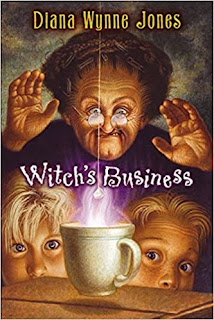Witch's Business
Witch's Business (Wilkins' Tooth), by Diana Wynne Jones
Our theme being "Old Friends and New," I started March with the first DWJ book I ever read (in 6th grade, about 1983). DWJ commented that when she started trying to get published in children's books in the early 1970s, fantasy was unfashionable. Publishers were only interested in what we used to call 'problem novels' -- realistic stories in which kids dealt with problems like child abuse, alcoholism, divorce, racism, and so on. So she wrote a story that started off as a problem novel featuring poverty and bullying, but turned out to be a fantasy. It was published in 1973.
Jess and Frank have had their pocket money stopped, and in desperation they start a business: Own Back, Ltd., will undertake revenge jobs and treasure hunting. They hope to be able to think up ways of tormenting the local bully, Buster Knell. Instead Buster hires them; he wants a tooth from Vernon Wilkins. And then the two odd girls down the lane, Jenny and Frankie Adams, want revenge on Biddy Iremonger, who is an adult. They claim that Biddy stole their house and inheritance, and made Jenny limp. Of course it's nonsense, but they might as well go talk to Biddy.
Biddy Iremonger is the local oddball, but she can't be a witch. She's just well-educated and eccentric, right? Frank and Jess are horrified when Biddy calmly says that yes, she's a witch, and she won't take off the curse. In fact, everyone is suffering Biddy's malice; she has enslaved the Adams adults and the bully gang, has used Wilkins' tooth in an evil spell, and now she has it in for Jess and Frank too. How on earth can they fight her?
Biddy Iremonger (who has a perfect name) is a truly scary character. She looks like your average oddball lady, but turns out to be vicious and uncaring. None of the adults are really helpful in any way. As in so many DWJ stories, the adults cannot be counted on to do any of the things they're supposed to do, and the kids have to use their ingenuity to figure out solutions.
I've read a couple of different versions of this book. Buster Knell is given to using horrible language, and DWJ got creative with it. In one version, it's literally colorful language -- he says things like "blue-purple pimpled zombies!" In the version I have now, zombies still feature prominently, but they're surrounded in body-bits and gross fluids, so he might say "Sliced toes in puke!" I think the colorful one is the original, but either way Buster has a truly creative vocabulary.
I think this story is kind of underestimated, though possibly only by me. It's her first published effort in children's fantasy, and I used to think it wasn't as good as the others; but these days, I'm newly impressed every time I read it. If you haven't yet added it to your DWJ list, do so!






A good start for your DWJ reading career! I started reading with Charmed Life only when I was in high school, but once I did, I wanted to track down all her books. This was an elusive one; my library did not have it, it was before the days of internet book searching, and it hadn't been reprinted yet. I vividly remember how excited I was years later when I found a copy in the University District branch of the Seattle Public Library and was finally able to check it out.
ReplyDeleteI hope it didn't disappoint! I had a similar experience with the Magicians of Caprona, which I didn't track down for years.
DeleteNo, I wasn't disappointed. I think it's really quite a subtly brilliant mix of realism and fantasy. I love the ensemble cast of children.
Delete